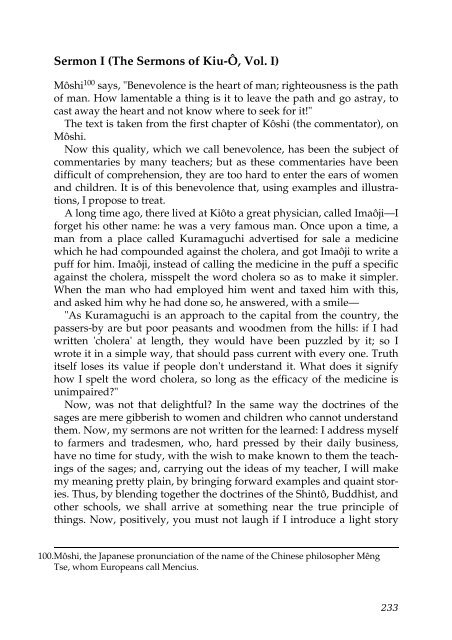You also want an ePaper? Increase the reach of your titles
YUMPU automatically turns print PDFs into web optimized ePapers that Google loves.
Sermon I (The Sermons <strong>of</strong> Kiu-Ô, Vol. I)<br />
Môshi 100 says, "Benevolence is the heart <strong>of</strong> man; righteousness is the path<br />
<strong>of</strong> man. How lamentable a thing is it to leave the path and go astray, to<br />
cast away the heart and not know where to seek for it!"<br />
The text is taken from the first chapter <strong>of</strong> Kôshi (the commentator), on<br />
Môshi.<br />
Now this quality, which we call benevolence, has been the subject <strong>of</strong><br />
commentaries by many teachers; but as these commentaries have been<br />
difficult <strong>of</strong> comprehension, they are too hard to enter the ears <strong>of</strong> women<br />
and children. <strong>It</strong> is <strong>of</strong> this benevolence that, using examples and illustrations,<br />
I propose to treat.<br />
A long time ago, there lived at Kiôto a great physician, called Imaôji—I<br />
forget his other name: he was a very famous man. Once upon a time, a<br />
man from a place called Kuramaguchi advertised for sale a medicine<br />
which he had compounded against the cholera, and got Imaôji to write a<br />
puff for him. Imaôji, instead <strong>of</strong> calling the medicine in the puff a specific<br />
against the cholera, misspelt the word cholera so as to make it simpler.<br />
When the man who had employed him went and taxed him with this,<br />
and asked him why he had done so, he answered, with a smile—<br />
"As Kuramaguchi is an approach to the capital from the country, the<br />
passers-by are but poor peasants and woodmen from the hills: if I had<br />
written 'cholera' at length, they would have been puzzled by it; so I<br />
wrote it in a simple way, that should pass current with every one. Truth<br />
itself loses its value if people don't understand it. What does it signify<br />
how I spelt the word cholera, so long as the efficacy <strong>of</strong> the medicine is<br />
unimpaired?"<br />
Now, was not that delightful? In the same way the doctrines <strong>of</strong> the<br />
sages are mere gibberish to women and children who cannot understand<br />
them. Now, my sermons are not written for the learned: I address myself<br />
to farmers and tradesmen, who, hard pressed by their daily business,<br />
have no time for study, with the wish to make known to them the teachings<br />
<strong>of</strong> the sages; and, carrying out the ideas <strong>of</strong> my teacher, I will make<br />
my meaning pretty plain, by bringing forward examples and quaint stories.<br />
Thus, by blending together the doctrines <strong>of</strong> the Shintô, Buddhist, and<br />
other schools, we shall arrive at something near the true principle <strong>of</strong><br />
things. Now, positively, you must not laugh if I introduce a light story<br />
100.Môshi, the <strong>Japan</strong>ese pronunciation <strong>of</strong> the name <strong>of</strong> the Chinese philosopher Mêng<br />
Tse, whom Europeans call Mencius.<br />
233



